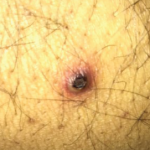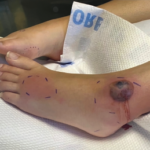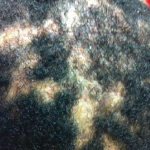In Sum
Here, we describe two patients seen in our inpatient rheumatology consultation service who were ultimately diagnosed with aseptic abscesses. As can be appreciated by these cases, substantial delays in diagnosis of this disease entity can occur. Increased awareness of this likely under-recognized disease would result in earlier recognition and treatment, potentially preventing significant morbidity.
Katherine Chakrabarti, MD, is a recent graduate of the rheumatology fellowship program and is a current clinical assistant professor in the Division of Rheumatology at the University of Michigan, Ann Arbor.
Andrew Vreede, MD, is a clinical assistant professor in the Division of Rheumatology at the University of Michigan, Ann Arbor, and also serves in the Rheumatology Section of Ann Arbor Veterans Administration Healthcare System.
Acknowledgment
The authors thank Michelle Sakala, MD, and Mahmoud Al-Hawary, MD, for their interpretation and preparation of imaging, as well as Rory Marks, MD, for reviewing the manuscript.
References
- André M, Aumaitre O, Marcheix JC, Piette JC. Aseptic systemic abscesses preceding diagnosis of Crohn’s disease by three years. Dig Dis Sci. 1995 Mar;40(3):525–527.
- André MFJ, Piette JC, Kémény JL, et al. Aseptic abscesses: A study of 30 patients with or without inflammatory bowel disease and review of the literature. Medicine (Baltimore). 2007 May;86(3):145–161.
- Vignon-Pennamen MD. The extracutaneous involvement in neutrophilic dermatoses. Clin Dermatol. May–Jun 2000;18(3):339–347.
- André M, Aumaître O. Aseptic abscesses syndrome. Rev Med Interne. 2011 Nov; 32(11):678–688.
- Elessa D, Thietart S, Corpechot C, et al. TNF-α antagonist infliximab for aseptic abscess syndrome. Presse Med. 2019 Dec;48(12):1579–1580.


